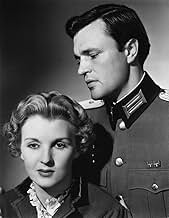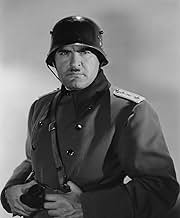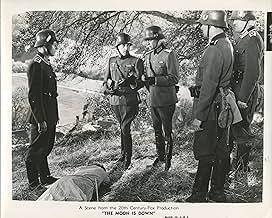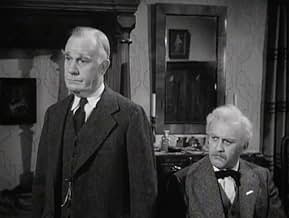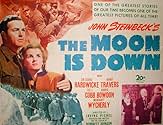During the Nazi occupation of Norway, a small Norwegian village struggles to cope with the invaders and some locals choose collaboration while others prefer armed resistance.During the Nazi occupation of Norway, a small Norwegian village struggles to cope with the invaders and some locals choose collaboration while others prefer armed resistance.During the Nazi occupation of Norway, a small Norwegian village struggles to cope with the invaders and some locals choose collaboration while others prefer armed resistance.
- Director
- Writers
- Stars
- Awards
- 6 wins total
Cedric Hardwicke
- Col. Lanser
- (as Sir Cedric Hardwicke)
Frederic Brunn
- German Soldier
- (as Frederick Brunn)
Ernst Deutsch
- Maj. Hunter
- (as Ernest Dorian)
Ludwig Donath
- Hitler's Voice
- (as Louis Donath)
Richard Abbott
- Villager
- (uncredited)
Louis V. Arco
- Schumann
- (uncredited)
Georgia Backus
- Villager
- (uncredited)
John Banner
- Lt. Prackle
- (uncredited)
Trevor Bardette
- Knute Pierson - Foreman
- (uncredited)
- Director
- Writers
- All cast & crew
- Production, box office & more at IMDbPro
Featured reviews
One of the better World War II propaganda films it has stood the test of time far better than a lot in the era. Possibly because the original source was a novel by one of America's best known authors John Steinbeck.
The story is about the Nazi occupation in a small Norwegian town and it is told from the viewpoint of both the conquered and the conquerors. As such in one of the few films of the era, Nazis are presented as three dimensional people and not just merciless Huns. The film also has no box office name stars which in the long run has probably helped with authenticity.
The Nazis invaded and occupied Norway to gain control of its long Atlantic coast line and prevent supplies from getting to the Soviet Union from Archangel and Murmansk. Except in certain circumstances the interior was left alone. This was one of those circumstances.
The town here has an iron mine which is the chief employer. The Reich wanted that mine, wanted the iron ore production stepped up, hence the occupation. Cedric Hardwicke is the commander of the occupying Nazi army and he deals with the occupational hazards of garrisoning a hostile town and making slave labor of its citizens.
Henry Travers is the mayor and Lee J. Cobb the town doctor and the leading two citizens of the town. Hardwicke tries to work with them and Travers especially tries to explain that you folks just aren't wanted. Hardwicke in fact deliberately refuses to remove Travers from office to put the local Quisling E.J. Ballantine in his place. In the end though he falls back on standard Nazi methods.
Ballantine should be singled out. He did not make too many film appearances and The Moon Is Down is his first. But even Hardwicke and his troops can't stand a traitor.
Peter Van Eyck has an interesting role too. The Scandinavians were viewed in the Nazi racial pecking order as fellow Aryans and the bad reception they got when taking over Denmark and Norway was a bit unsettling to their troops. They were told that occupation and the chance to join the Reich would be welcomed. Van Eyck who's a country kid tries to make friends and it unnerves the hate that he's given in return.
This film is a real gem from the World War II years. It should be rediscovered and evaluated as one of the best films of the era.
The story is about the Nazi occupation in a small Norwegian town and it is told from the viewpoint of both the conquered and the conquerors. As such in one of the few films of the era, Nazis are presented as three dimensional people and not just merciless Huns. The film also has no box office name stars which in the long run has probably helped with authenticity.
The Nazis invaded and occupied Norway to gain control of its long Atlantic coast line and prevent supplies from getting to the Soviet Union from Archangel and Murmansk. Except in certain circumstances the interior was left alone. This was one of those circumstances.
The town here has an iron mine which is the chief employer. The Reich wanted that mine, wanted the iron ore production stepped up, hence the occupation. Cedric Hardwicke is the commander of the occupying Nazi army and he deals with the occupational hazards of garrisoning a hostile town and making slave labor of its citizens.
Henry Travers is the mayor and Lee J. Cobb the town doctor and the leading two citizens of the town. Hardwicke tries to work with them and Travers especially tries to explain that you folks just aren't wanted. Hardwicke in fact deliberately refuses to remove Travers from office to put the local Quisling E.J. Ballantine in his place. In the end though he falls back on standard Nazi methods.
Ballantine should be singled out. He did not make too many film appearances and The Moon Is Down is his first. But even Hardwicke and his troops can't stand a traitor.
Peter Van Eyck has an interesting role too. The Scandinavians were viewed in the Nazi racial pecking order as fellow Aryans and the bad reception they got when taking over Denmark and Norway was a bit unsettling to their troops. They were told that occupation and the chance to join the Reich would be welcomed. Van Eyck who's a country kid tries to make friends and it unnerves the hate that he's given in return.
This film is a real gem from the World War II years. It should be rediscovered and evaluated as one of the best films of the era.
This movie has no big-box office stars, nor a major director. Yet it tells its story effectively and, sometimes, in a deeply moving fashion, because the script is good and the actors, accustomed to playing character roles, make real individuals out of their assignments.
The movie starts off by establishing several points: 1) Norway fell fast to the Germans not because they were weak or pro-Nazi, but because they were betrayed from the inside by fifth columnists (Quislings), a fear that runs through several wartime U.S. movies (Keeper of the Flame is perhaps the best of those.) 2) The Norwegians are decent people, and therefore worth helping. The town's militia refuse to shoot at the German paratroopers as they are falling through the sky because "you're not supposed to do that," even though the Germans promptly slaughter the militia from hidden positions.
This could be compared to American movie presentations of the fall of France, in which the French are not portrayed as having been betrayed from the inside - though in fact they were, to an extent, by Pétain. That may, at least in part, be because the American government maintained diplomatic relations of a sort with the Vichy government until the Germans finally invaded formerly "Free France" in the hope of winning them over, with the result that Pétain could not be portrayed as the traitor he really was.
This is a fine movie, worth watching.
The movie starts off by establishing several points: 1) Norway fell fast to the Germans not because they were weak or pro-Nazi, but because they were betrayed from the inside by fifth columnists (Quislings), a fear that runs through several wartime U.S. movies (Keeper of the Flame is perhaps the best of those.) 2) The Norwegians are decent people, and therefore worth helping. The town's militia refuse to shoot at the German paratroopers as they are falling through the sky because "you're not supposed to do that," even though the Germans promptly slaughter the militia from hidden positions.
This could be compared to American movie presentations of the fall of France, in which the French are not portrayed as having been betrayed from the inside - though in fact they were, to an extent, by Pétain. That may, at least in part, be because the American government maintained diplomatic relations of a sort with the Vichy government until the Germans finally invaded formerly "Free France" in the hope of winning them over, with the result that Pétain could not be portrayed as the traitor he really was.
This is a fine movie, worth watching.
"Haven't we some little right to life?"
To that question by one of the characters in the Nazi-conquered Norwegian town, actually, no, not when governments say "Fight. Destroy. Kill."
When governments say "You must have a number" and "You must carry this card embossed with that number" or "You must wear this uniform" and "You must kill that other human being," you are being considered as property, and that means you no longer have rights.
At least that is how governments want you to believe.
You are expected to obey, not think. Obey, not have desires of your own. You are a cog in the great machinery of the state.
"The Moon Is Down" was intended specifically as anti-Nazi propaganda, coming as it did shortly after the United States entered World War II, but there is a deeper and more universal meaning.
Even Nazis, or at least German soldiers lured or forced into war by German leaders of the National Socialist German Workers Party, or Nazis, have some vestiges of humanity -- at least some of them.
Told their lives belong to the state, to the fatherland, and that they must act, even die, for purposes of the Master Race, and not to think of or for themselves, still sometimes selfish desires rise to the fore, and such basics as love or freedom motivate more than do orders.
Death and destruction are inevitable results of the subordination of individuals and individuality to the state, to the society, to the race.
Humanity's bloodiest century, the twentieth, proved the truth of that statement with the rise of Nazism and Communism, both of which demanded the submersion of individuals into the mass.
When individual humans no longer matter, mass murders become mere matters of strategy, or "the continuation of politics by other means," as von Clausewitz is quoted.
Few movies illustrate the horror and degradation of war and governments better than "The Moon Is Down," which was presented on Turner Classic Movies the night of 2 January 2017. I had read the John Steinbeck book decades ago and not appreciated that message, not even seen it, that early in my life.
Now, though, after long years lived with the threat of war or some act of tyranny hanging over me nearly every day of that time, I do appreciate the tale and its moral, or at least the moral I now see.
Steinbeck wrote this, a good summation of the meaning of "The Moon Is Down": "Free men cannot start a war, but once it is started, they can fight on in defeat. Herd men, followers of a leader, cannot do that, and so it is always the herd men who win battles and the free men who win wars."
We are engaged on a daily basis in an ongoing war of individualism versus a leader, versus the mob, versus the collective, versus the state, or, especially these last few decades, versus a murderous and destructive movement some try to call a religion.
I would like to recommend "The Moon Is Down" in both book and movie form, not for entertainment, since there is no joy or pleasure in either, but for the object lesson: Do not let politicians and governments control your life.
To that question by one of the characters in the Nazi-conquered Norwegian town, actually, no, not when governments say "Fight. Destroy. Kill."
When governments say "You must have a number" and "You must carry this card embossed with that number" or "You must wear this uniform" and "You must kill that other human being," you are being considered as property, and that means you no longer have rights.
At least that is how governments want you to believe.
You are expected to obey, not think. Obey, not have desires of your own. You are a cog in the great machinery of the state.
"The Moon Is Down" was intended specifically as anti-Nazi propaganda, coming as it did shortly after the United States entered World War II, but there is a deeper and more universal meaning.
Even Nazis, or at least German soldiers lured or forced into war by German leaders of the National Socialist German Workers Party, or Nazis, have some vestiges of humanity -- at least some of them.
Told their lives belong to the state, to the fatherland, and that they must act, even die, for purposes of the Master Race, and not to think of or for themselves, still sometimes selfish desires rise to the fore, and such basics as love or freedom motivate more than do orders.
Death and destruction are inevitable results of the subordination of individuals and individuality to the state, to the society, to the race.
Humanity's bloodiest century, the twentieth, proved the truth of that statement with the rise of Nazism and Communism, both of which demanded the submersion of individuals into the mass.
When individual humans no longer matter, mass murders become mere matters of strategy, or "the continuation of politics by other means," as von Clausewitz is quoted.
Few movies illustrate the horror and degradation of war and governments better than "The Moon Is Down," which was presented on Turner Classic Movies the night of 2 January 2017. I had read the John Steinbeck book decades ago and not appreciated that message, not even seen it, that early in my life.
Now, though, after long years lived with the threat of war or some act of tyranny hanging over me nearly every day of that time, I do appreciate the tale and its moral, or at least the moral I now see.
Steinbeck wrote this, a good summation of the meaning of "The Moon Is Down": "Free men cannot start a war, but once it is started, they can fight on in defeat. Herd men, followers of a leader, cannot do that, and so it is always the herd men who win battles and the free men who win wars."
We are engaged on a daily basis in an ongoing war of individualism versus a leader, versus the mob, versus the collective, versus the state, or, especially these last few decades, versus a murderous and destructive movement some try to call a religion.
I would like to recommend "The Moon Is Down" in both book and movie form, not for entertainment, since there is no joy or pleasure in either, but for the object lesson: Do not let politicians and governments control your life.
...based on a novel by John Steinbeck, and directed by Irving Pichel. German forces occupy a small Norwegian village. The coolly pragmatic German leader Col. Lanser (Cedric Hardwicke) tries to set up the occupation with strict efficiency. However, various townsfolk begin to rise up, first in small ways, eventually getting deadlier, leading to misery on both sides. Also featuring Natalie Wood in her debut, but I'll get back to that later.
Having already watched Hangmen Also Die, Hitler's Madman, Commandos Strike at Dawn, and Edge of Darkness, all from 1943, this material is well-worn for me. However, I still managed to enjoy this more dialogue-heavy look at the familiar scenario. Hardwicke is very good as the German officer in charge, more interested in being a quietly effective administrator than a cruel dictator. Henry Travers is excellent as the wise town mayor. Peter van Eyck, who appeared as a German soldier in 6 1943 releases, is moving as a sympathetic soldier. For some reason the filmmakers have 31-year-old Lee J. Cobb playing an old guy in white wig and makeup...there were no actual older actors available? Dorris Bowden, the ostensible female lead, is very uneven as an angry widow. She has some good moments, and others that seem amateurish, but since she was married to producer-screenwriter Nunnally Johnson at the time, she got the part.
Natalie Wood's appearance is a bit problematic. Although uncredited, she's very visible in her one scene, and I thought it was her before I even knew she was supposed to be in the film. Some sources have this listed as Wood's debut while still others say it is not Natalie Wood at all. Regardless, the film is enjoyable, and the ending is very memorable.
Having already watched Hangmen Also Die, Hitler's Madman, Commandos Strike at Dawn, and Edge of Darkness, all from 1943, this material is well-worn for me. However, I still managed to enjoy this more dialogue-heavy look at the familiar scenario. Hardwicke is very good as the German officer in charge, more interested in being a quietly effective administrator than a cruel dictator. Henry Travers is excellent as the wise town mayor. Peter van Eyck, who appeared as a German soldier in 6 1943 releases, is moving as a sympathetic soldier. For some reason the filmmakers have 31-year-old Lee J. Cobb playing an old guy in white wig and makeup...there were no actual older actors available? Dorris Bowden, the ostensible female lead, is very uneven as an angry widow. She has some good moments, and others that seem amateurish, but since she was married to producer-screenwriter Nunnally Johnson at the time, she got the part.
Natalie Wood's appearance is a bit problematic. Although uncredited, she's very visible in her one scene, and I thought it was her before I even knew she was supposed to be in the film. Some sources have this listed as Wood's debut while still others say it is not Natalie Wood at all. Regardless, the film is enjoyable, and the ending is very memorable.
I know next to nothing about Director Irving Pichel, but readily admit that his 1943 flick, THE MOON IS DOWN, deserves a special mention among propaganda films made during World War II.
With the similarly entitled novel by Nobel literature laureate John Steinbeck as the framework, Pichel handles the material and a cast of very good English and US actors such as Cedric Hardwicke, Lee J Cobb, German-born Peter Van Eyck, with aplomb and purpose.
The cinematography by Arthur Miller deserves praise, despite flaws: it cannot have been easy to make films at the height of the war.
Definitely worth watching. 7/10.
With the similarly entitled novel by Nobel literature laureate John Steinbeck as the framework, Pichel handles the material and a cast of very good English and US actors such as Cedric Hardwicke, Lee J Cobb, German-born Peter Van Eyck, with aplomb and purpose.
The cinematography by Arthur Miller deserves praise, despite flaws: it cannot have been easy to make films at the height of the war.
Definitely worth watching. 7/10.
Did you know
- TriviaFilmed on the same sets used for the Welsh mining village in Qu'elle était verte ma vallée (1941).
- GoofsMost of the German soldiers are wearing WWI-style Stahlhelm helmets, not the WWII version used from 1935 on. Also, paratroopers (Fallschirmjagers) are shown, but none of the German troops are wearing their helmet - without the projecting visor and flared rim.
- Quotes
Lt. Tonder: Last night I dreamed that Hitler was crazy!
- Crazy creditsOpening credits are shown with a hand gesturing to a map of Norway, indicating what is about to take place in the film.
- How long is The Moon Is Down?Powered by Alexa
Details
- Runtime1 hour 30 minutes
- Color
- Aspect ratio
- 1.37 : 1
Contribute to this page
Suggest an edit or add missing content


